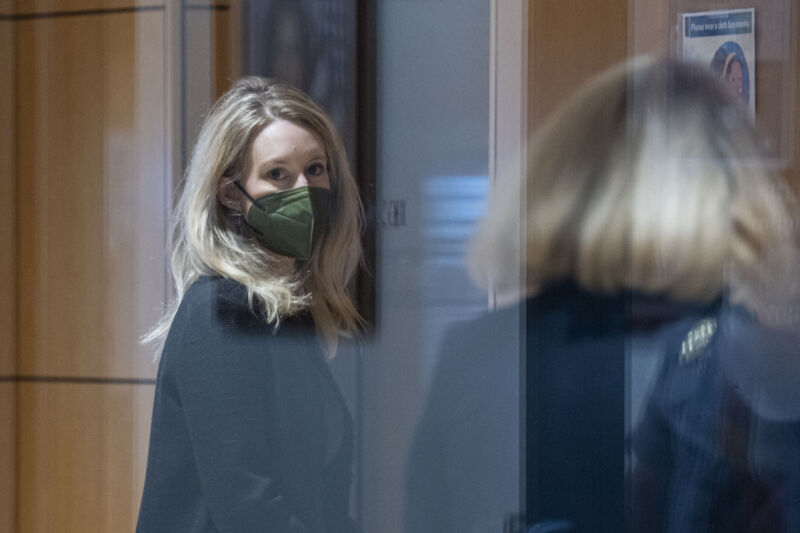

Theranos device “made a bunch of noise” but did nothing else in Safeway demo
source link: https://arstechnica.com/tech-policy/2021/10/theranos-device-made-a-bunch-of-noise-but-did-nothing-else-in-safeway-demo/
Go to the source link to view the article. You can view the picture content, updated content and better typesetting reading experience. If the link is broken, please click the button below to view the snapshot at that time.

Theranos trials —
Theranos device “made a bunch of noise” but did nothing else in Safeway demo
Grocer did over 100 hours of due diligence on Theranos deal, ex-CEO says.
Tim De Chant - 10/13/2021, 2:37 PM

Safeway’s ex-CEO said his company did more than 100 hours of due diligence for a deal with Theranos that would ultimately cost the grocery chain over $360 million before the agreement was axed.
Yet, even after that research, when Safeway trialed Theranos’ diagnostic devices at its corporate headquarters for almost a year, then-CEO Steven Burd said it became clear that the startup was a mess, losing patients’ tests and returning weird results.
“I think whenever you start something new, you’re going to have some rough spots, but we continued to have rough spots,” he said. “We had samples that were lost. We had results that didn’t make any sense.”Burd’s revelations emerged during cross-examination by Elizabeth Holmes’ defense attorney, Kevin Downey. Holmes is on trial for 10 counts of wire fraud and two counts of conspiracy to commit wire fraud.
The court also heard more from Burd about the “test” that Holmes performed when pitching Safeway’s board members. Michael Shannon, a board director, had his finger pricked and his blood assessed for prostate-specific antigen, a screening test for prostate cancer. The Theranos device “made a bunch of noise,” Burd said, but never delivered a result. Holmes, he added, “said something that made us think we would get it later.” They didn’t.
Due diligence questioned
In his cross-examination, Downey pressed Burd on the finer points of the Safeway-Theranos deal, trying to make the case that the experienced executive knew what he was getting into—he had been CEO of the grocery chain for almost two decades when he met the 26-year-old Holmes.
Advertisement“You knew at the time she was a very young entrepreneur?” Downey asked him.
“Correct,” Burd replied.
“Is it fair to say in the process of doing a deal, Safeway did hundreds of hours of due diligence?” Downey asked.
“At least 100,” Burd said.
The deal called for Safeway to pay Theranos $85 million in addition to renovating its stores to accommodate small labs for the blood-testing devices. For a deal that size, more than 100 hours is a significant amount of time spent on due diligence, according to a biotech executive Ars spoke with. The figure Burd mentioned in court was so high that the executive wondered whether Burd was counting diligence done by other investors toward Safeway’s total, which is sometimes the case at smaller companies.
As part of the diligence process, Burd said he spoke with doctors and lab directors at Johns Hopkins and the University of California, San Francisco. But the Johns Hopkins experts said they had not spent enough time with Theranos’ device to validate it.
Holmes had promised Safeway executives that her company’s diagnostic device could return results to patients in 20 to 30 minutes. Yet, when Safeway was testing the machines, it was taking three to five days for Theranos to send results back to patients.The contract for the deal did not contain any specific timelines, though the Safeway board had been given presentations in 2010 that outlined a pilot program rollout in the first quarter of 2011 and an official launch in grocery stores in the middle of 2011. Safeway had hoped to expand testing to over 900 stores in 22 states.
Safeway did have several ways to back out of the deal. If they didn’t like the way the pilot program was proceeding or if the FDA was going to bring regulatory action against the startup, they could cancel with 30 days' notice. Ultimately, Theranos never made it that far. By the time the deal finally dissolved in 2015, Safeway had spent over $300 million preparing its stores.
Recommend
About Joyk
Aggregate valuable and interesting links.
Joyk means Joy of geeK